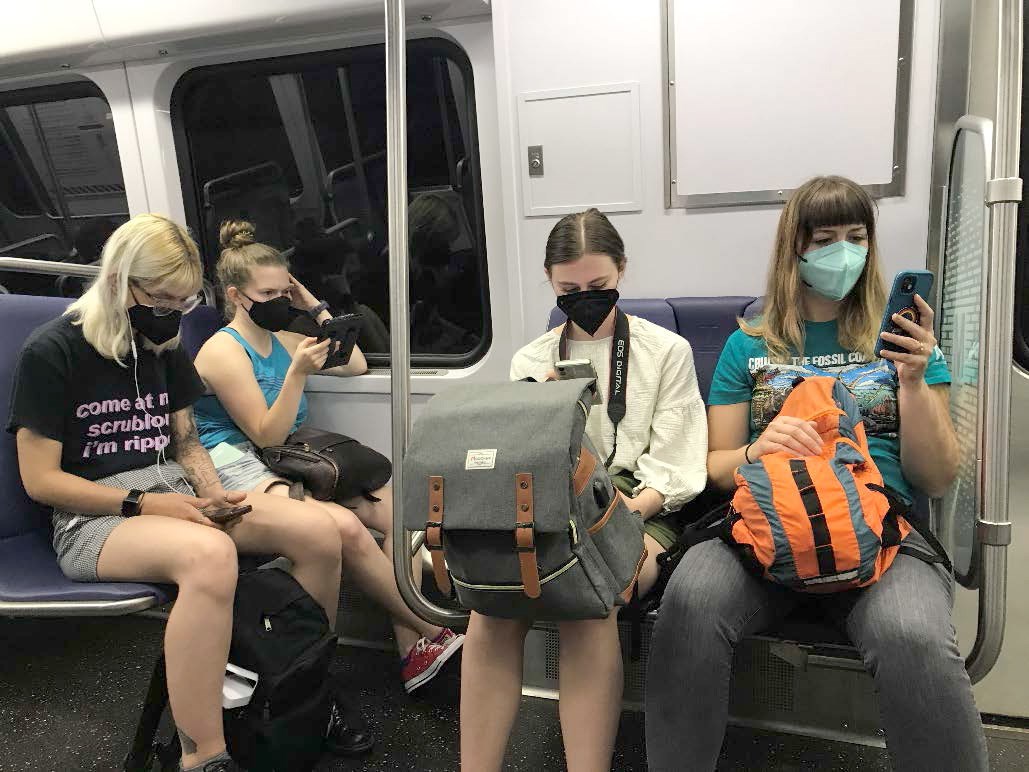October 31, 2022
by Caroline Funk

I was going to tell you a story of heroic adaptation to adversity in Arctic research. In that story, the Aleutian Mercury project students shine like stars during the intellectual shift from planned field work to scientifically complex collections-based research in three separate research institutions across the US.
Because the students did shine like intellectual research stars.

Look at them (Jay, Taylor, Heather, and Miranda), masked, experienced, and effective research assistants in the Smithsonian National Museum of Natural History’s offsite research facility. (We are missing Mary here, as she stayed in Alaska for this leg of the work).
But their resilience is farther reaching and the story is more interesting. It all started in May 2022, seven duffels on seven living room floors, surrounded by personal gear. Action packers lined up in labs; science gear stacked and ready. Planes tickets purchased; permits and MOAs in hand. Our pandemic-delayed Agattu Island field research was finally a go. We were aimed to learn about far western ancestral Unangax^ lives and to acquire a 3,000-year sequence of Steller sea lion, Northern Fur seal and Pacific cod bones from a region known to be a modern mercury hotspot.
But, alas, we were destined to fail.
There was an engine failure on our charter vessel and less than two weeks before deploying, our chartered vessel canceled the contract rather than risk stranding us all in the Bering Sea. Thanks charter vessel, for keeping us safe, and at the same time: ugh.
Nicole Misarti and I consulted with anyone who would hold still at NSF, at our universities, on our research team, and we pivoted from field to facility. We set up sampling at Museum of the Aleutians and at the Smithsonian National Museum of Natural History. We planned sample preparation at University of Alaska, Fairbanks. We developed a method for training our field crew in rapid form faunal analysis, archival research, and sample recordation protocols. There may have been weeping (me), possibly wailing (again, me), but the project was going to move forward through sheer force of will.
And I repeat, the young scholars—who all stayed on despite the loss of field adventure to the remotest Aleutian Islands—shined as they learned our techniques. We paired more experienced people with less experienced, we learned each person’s particular skills and personal proclivities toward writing, visualizing, categorizing, and we shamelessly deployed them for the project’s gain.
It worked. And that’s good. But telling the intellectual success story leaves out the reasons why I respect and appreciate this group of folks who threw in with our unexpected research pivot.
They adapted to all of it.
 Jay and Heather in Buffalo International Airport, Day 1.
Jay and Heather in Buffalo International Airport, Day 1.
The endless air travel (seven legs for the UB crew); the car travel across Alaska, the janky motel stays, tiny house, or dormitory accommodations; the super janky truck loans in remote villages; the DC metro, in the rain, in a heat wave, through urine scented streets and in mask-wearing commuter crowds. Like they do this every day.

Caroline, Heather, and Jay stayed at a 1-star motel along the way.
The motel was a significant upgrade for the students, who had been living in basement dorms at UAF.

Janky truck loan (THANK YOU VERY MUCH) and 600sq foot house for the student crew.

The Red Line in Washington, DC.
The crew adapted and worked together to form a comfortable domesticity among themselves. (Except, I heard, during Donner Dinner Party board game sessions in Fairbanks where Mary longed to win.)

Mary winning at Donner Dinner Party – or so I was told when this image showed up in our files.
These five young women scholars showed up to work every day with positivity and competence. The fact that they did, through the constant change, enforced sociality, and endless travel is what makes them extraordinary. And we are grateful.
Next summer: Redo Agattu, not Janky Field Season*.
*Thanks to Heather Lackos for perfectly naming the summer’s work “the janky field season” on day 1 in Dutch Harbor. Perfect.
All photos above courtesy of Caroline Funk & AMD.